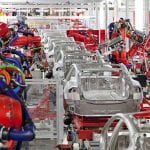Around The Web
Climate change: Is Greta Thunberg right about UK carbon emissions?
California defends forestry offset protocol amid academic criticism
California’s response to ETS oversupply leaves lawmakers debating action -senator
Tesla gears up from production hell to logistical nightmare
 Elon Musk recounts "insane” first quarter for the EV maker, with half of Tesla's global deliveries carried out in the final 10 days of the reporting period.
Elon Musk recounts "insane” first quarter for the EV maker, with half of Tesla's global deliveries carried out in the final 10 days of the reporting period.
The post Tesla gears up from production hell to logistical nightmare appeared first on RenewEconomy.
Electricity in China isn’t cheap anymore
 China's coal generation costs are similar to Australia - and they are not cheap.
China's coal generation costs are similar to Australia - and they are not cheap.
The post Electricity in China isn’t cheap anymore appeared first on RenewEconomy.
Federal election campaigning to ramp up as half-way mark approaches
Oceans hit by bigger waves and winds over past 33 years, study finds
Trump halts plans to expand offshore drilling after legal setback
Court decision blocking fossil fuel activity in swaths of the Arctic complicated administration plans to ramp up fossil fuel extraction
The Trump administration has shelved plans to vastly expand offshore oil and gas drilling in the wake of a recent court decision that blocked fossil fuel activity in swaths of the Arctic.
The administration had opened up almost all US waters to companies seeking to drill oil or gas deposits but this expansion has been halted due to a legal setback, according to David Bernhardt, the interior secretary.
Continue reading...Bizarrely distributed and verging on extinction, this 'mystic' tree went unidentified for 17 years
Extinction Rebellion holds Hyde Park rally to mark 'pause' in protests
Ceremony in London park marks break in activism after day spent targeting the City
Hundreds of Extinction Rebellion activists have gathered at Hyde Park Corner in London to celebrate a pause in the protests that have gripped London for over a week and are preparing to take the fight back to local communities.
Climate protesters targeted the city’s financial hub on Thursday to highlight the role the sector plays in climate change. The environmental group said it was the last day of action before choosing to stop this stage of its campaign of peaceful mass civil disobedience, following protests in which hundreds of people were arrested and thousands of police officers deployed to sites occupied by the group for more than a week.
Continue reading...'Make EU trade with Brazil sustainable'
Message to the EU: you have the chance to stop fuelling devastation in the Amazon
Polly Higgins obituary
What would it take to create a legal duty of care for the Earth? That is the question the Scottish barrister Polly Higgins found herself asking 15 years ago; a question that led her to abandon her courtroom career and embark on a quest to establish an international crime of ecocide. Such a crime would render persons of superior responsibility (such as company chief executives and government ministers) liable to prosecution for causing or contributing to large-scale ecosystem destruction.
Polly, who has died aged 50 of cancer, had begun to see the climate activist movement take up her call in the weeks before her death, with Extinction Rebellion actions demanding that ecocide law be established around the world.
Continue reading...Norwich Cathedral peregrine falcons' chicks hatch
The Extinction Rebellion scorecard: what did it achieve?
After two weeks of mass civil disobedience, we look at what has changed
Organisers of the climate protests that have seen peaceful mass civil disobedience across London over the past two weeks have said the first stage of the “rebellion” is drawing to a close. How much of an impact has it had, and how realistic are its goals?
Continue reading...Thousands of emperor penguin chicks drown
Iberdrola’s remaining EU ETS-based output jumps 22% in Q1, Vattenfall profits rise as clean generation thrives on higher CO2 costs
Chris Packham defiant after activists leave dead crows at his home
BBC Springwatch presenter condemns campaigners in row over ban on shooting birds
Chris Packham has said he will not be intimidated by campaigners who left two dead crows hanging outside his home and glued shut his security gate.
The broadcaster told the police about the threats and vandalism, which came after the Wild Justice group he founded with fellow conservationists Ruth Tingay and Mark Avery successfully challenged the “general licence” that allowed the shooting of 16 species of bird, including crows, jays and woodpigeons.
Continue reading...UK's 'creative carbon accounting' breaches climate deal, say critics
UK exclusion of international aviation and shipping figures from carbon budgets was highlighted by Greta Thunberg
The UK is breaching the Paris agreement on climate change by excluding international aviation and shipping figures from carbon budgets, according to a leading NGO.
Swedish campaigner Greta Thunberg accused the British government this week of “very creative carbon accounting” after the government defended its work to reduce greenhouse gas emissions.
Continue reading...MPs warn post-Brexit environment plans fall ‘woefully short’
Proposals to replace EU rules ‘downgrade’ green principles, says cross-party committee
Proposals to replace the EU’s strong environmental protections after Brexit “fall woefully short”, according to a highly critical report from a cross-party committee of MPs.
The environment secretary, Michael Gove, said in December that the UK’s environmental standards would be enhanced after Brexit. But the MPs’ report said the proposals “severely downgrade” the environmental principles that underpin current EU rules.
Continue reading...


